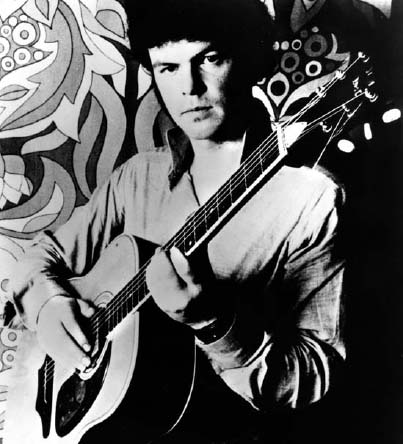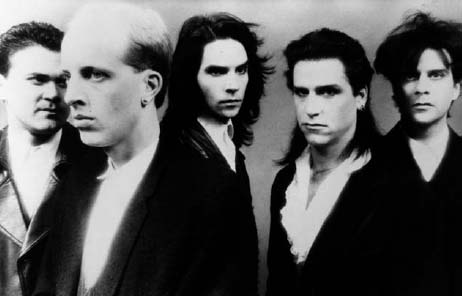The Encyclopedia of Dead Rock Stars (242 page)
Read The Encyclopedia of Dead Rock Stars Online
Authors: Jeremy Simmonds

Northern Irish singer/songwriter David McWilliams gave the world at least one classic song but his career was to be hampered by one crucial factor: his manager was a shareholder of Radio Caroline.
McWilliams was born in Belfast, a keen footballer who might have made it professionally had he not become obsessed with music, and especially with the songwriting of Buddy Holly. Despite his background, McWilliams more closely resembled an outlaw from the Wild West, with his three-quarter beard and dusty Stetson, when he first created a stir in 1967. While a debut album,
David McWilliams Sings Songs by David McWilliams,
fared well on Major Minor, its follow-up reached UK number twenty-three – largely because of the inclusion of the genuinely haunting ‘The Days of Pearly Spencer’, a song about a homeless man McWilliams had befriended. This would surely have been a major hit if it hadn’t have been for a ban by the sniffy BBC, who – despite having poached half their DJs from Radio Caroline – didn’t want to be seen associating with the pirate radio station that was playing the track incessantly. McWilliams had to wait a quarter of a century to see Marc Almond’s version of the song claim its rightful place in the UK Top Five.
As it was, McWilliams’s songs were to remain a little-known treat, the nearest he came to a hit single thereafter being with ‘By the Lights of Cyrian’ in 1977. Almost unheard from in his last years, David McWilliams died from natural causes in County Antrim.
FEBRUARY
Saturday 2
Paul Baloff
(Oakland, California, 25 April 1960)
Exodus
(Piranha)

Singer Paul Baloff can hold a serious claim to be a pioneer of thrash metal – although, ultimately, it was others who were to collect on his investment. Forming Exodus in 1981, Baloff found himself at the core of California’s burgeoning Bay Area metal scene, alongside bands such as Testament and Death Angel. Exodus – Baloff (vocals), Gary Holt (guitar), Kirk Hammett (guitar), Geoff Andrews (bass) and Tom Hunting (drums) – began solidly but were to lose out when Hammett left to join the band that was to become the biggest of the genre, Metallica. After recording the acclaimed first album,
Bonded by Blood
(1985), Baloff became worn down by infighting and left Exodus to form Piranha, but the glory days were now behind him. Exodus, with Baloff, reunited to tour in 1997 and issue the group’s final offering,
Another Lesson in Violence.
Paul Baloffs sudden death from a stroke came as an enormous blow to the thrash community as a whole, although his health had never been particularly good. His life support was switched off when he failed to emerge from a coma.

David McWilliams: In the days of pirate sponsors
Wednesday 13
Waylon Jennings
(Littlefield, Texas, 15 June 1937)
(The Outlaws)
(The Highwaymen)
(Old Dogs)

Had he not passed away in 2002, Waylon Jennings would undoubtedly have earned this book’s award for rock ‘n’ roll’s closest ever call. While he certainly shouldn’t primarily be remembered for his role in the passing of a legend, the careers of Waylon Jennings and Buddy Holly will always be inextricably linked in other ways. Jennings was born during the Texas ‘Dust Bowl’ storms of the thirties (documented closely by one of his heroes, Woody Guthrie), his singing and guitar-picking appealing to local radio producers, who were keen to give him airtime. The early rock ‘n’ roll circuit saw him interchange slots with Holly and Roy Orbison as the state’s key emerging talents. Holly was the first to make it big; after his own flurry of successes, the bespectacled rocker then became the first to produce Jennings. Although this didn’t provide the latter with any gold discs, Holly was keen to invite him along as touring bass (despite the fact that it was not his instrument), The Crickets having gone their separate ways: the tour in question was the Winter Dance Party of 1959. As the weather worsened and the tour bus gradually began to fall apart, Holly, Jennings and others decided to fly on to the next venue in North Dakota. With the Big Bopper suffering particularly badly, Jennings gave the hefty star his seat on the hired Beechcraft – and the rest, as they say, is rock ‘n’ roll history.
It was to take many years for Jennings to come to terms with the horrific accident that took the life of Holly, Richardson and Richie Valens ( Pre-1965)
Pre-1965)
– particularly in light of that infamous pre-flight joke he shared with Holly. But Jennings was to return in some style a few years later, having ditched rock ‘n’ roll for an ‘outlaw’ sound set to become his trademark (as it would for empathetic performers Johnny Cash, Kris Kristofferson and Willie Nelson, with whom Jennings was to form The Highwaymen in later years). Relocating to Phoenix, Arizona and then Nashville, Tennessee, the guitarist steeped himself in good country vibes and began to churn out the hits on A&M (most of which appeared on the 1970 album
Don’t Think Twice),
although his insistence on having his own band was not looked upon well by the labels of Nashville who presumably didn’t like paying other musicians. Despite his relative success, Jennings’s life at this time seemed permanently hampered by problems: the musician was addicted to amphetamines and in enormous debt, with various of his marriages collapsing around him (he had four wives in all). In 1972, a bout of hepatitis almost ended his life.
The turning point came shortly after his recovery with a new contract that satisfied Jennings’s desire to tour properly. With Nelson, Jennings formed the semi-permanent Outlaws (with singer/producer Tompall Glaser), the duo issuing some great, rough-hewn country recordings during the seventies and eighties. Waylon Jennings managed sixteen country chart-toppers over the years and also picked up a pair of Grammys into the bargain – something even he might not have expected at the start of the seventies. Throughout his career the hugely respected Jennings was to befriend musicians from across the genres: during the nineties, for instance, he became close friends with thrash-metal heroes Metallica (in whose music he discovered a similar integrity to his own) and also recorded with Los Lobos. In a final foray into supergroupdom, he recorded an album,
Old Dogs
(1998), with country pals Bobby Bare, Jerry Reed and Merle Tillis.
Several months after his worsening diabetes required the amputation of his left foot, Waylon Jennings breathed his last in his sleep and the world whispered goodbye to one of country music’s wildest, wittiest exponents. Presumably, Jennings and Holly can at last see the funny side of that throwaway comment all those decades before.
Sometime Waylon Jennings associate Jack Reno died in November 2008.
Thursday 14
Mick Tucker
(Harlesden, London, 17 July 1949)
The Sweet

He wasn’t the main attraction in Britain’s most glamorous pop act of the early seventies, but perhaps that’s the way Sweet drummer Mick Tucker preferred it. The band, in which the characters of the other members were more readily identifiable – Brian Connolly (vocals/silver stack heels), Steve Priest (bass/’ladyboy’ makeup) and (finally) Andy Scott (guitar/spooky glances) – had been Wainwright’s Gentlemen and Sweetshop before settling on the shortened name that was to serve them so well between 1971 and 1978. As part of the classic band line-up, Tucker enjoyed massive UK hits from the poppy ‘Co Co’ (1971) and ‘Little Willy’ (1972) to the anthemic, Chinnichap-composed metal bubblegum of ‘Ballroom Blitz’ and the number one ‘Blockbuster’ from an all-conquering 1973 in which they also cracked the US market.
‘I hope your plane crashes!’
Waylon’s cheery banter of 2 February 1959
